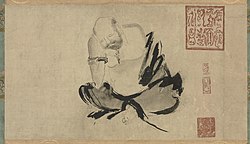Though Zen is said to be based on a "special transmission outside scriptures" which "did not stand upon words", the Zen-tradition has a rich doctrinal...
52 KB (6,644 words) - 17:29, 24 May 2025
Important Zen texts and genres include: Zen "sutras" or "scriptures" (Ch: jīng) such as the Platform Sutra, a key work in the development and history of Zen. The...
203 KB (23,598 words) - 03:41, 10 July 2025
Thiền (redirect from Vietnamese Zen)
Thiền tông, 禪宗, IPA: [tʰîən təwŋm]) is the name for the Vietnamese school of Zen Buddhism. Thiền is the Sino-Vietnamese pronunciation of the Middle Chinese...
18 KB (2,205 words) - 18:18, 28 May 2025
Zen master is a somewhat vague English term that arose in the first half of the 20th century, sometimes used to refer to an individual who teaches Zen...
17 KB (2,164 words) - 23:55, 4 May 2025
Zen for an overview of Zen, Chan Buddhism for the Chinese origins, and Sōtō, Rinzai and Ōbaku for the three main schools of Zen in Japan Japanese Zen...
53 KB (6,040 words) - 21:05, 22 June 2025
Korean Seon (redirect from Korean Zen)
Chan Buddhism, a branch of Mahāyāna Buddhism commonly known in English as Zen Buddhism. Seon is the Sino-Korean pronunciation of Chan, (Chinese: 禪; pinyin:...
24 KB (2,759 words) - 23:32, 28 June 2025
surviving Chinese version), states that Bodhidharma is not the first ancestor of Zen, but instead the second. This text instead claims that Guṇabhadra, the translator...
85 KB (9,329 words) - 10:28, 1 July 2025
Chan Buddhism (redirect from Chinese Zen)
New York. Though Zen-narrative states that it is a "special transmission outside scriptures" which "did not stand upon words", Zen does have a rich doctrinal...
106 KB (13,062 words) - 00:00, 8 June 2025
Eisai (category Zen Buddhist priests)
monastery. After his certification as a Zen teacher, Eisai returned to Japan in 1191, bringing with him Zen scriptures and green tea seeds. He immediately...
12 KB (1,522 words) - 10:23, 10 June 2025
101 Zen Stories is a 1919 compilation of Zen koans including 19th and early 20th century anecdotes compiled by Nyogen Senzaki, and a translation of Shasekishū...
2 KB (178 words) - 05:33, 16 January 2025
Arts 功夫) common in the teachings of Chan Buddhism, Korean Seon and Rinzai Zen. Hua Tou can be translated as 'word head', 'head of speech' or 'point beyond...
10 KB (1,339 words) - 14:42, 12 June 2025
Mu (negative) (redirect from Mu (zen))
bottom of wu, 舞 "dance". The Gateless Gate, a 13th-century collection of Zen kōan, uses the word wu or mu in its title (Wumenguan or Mumonkan 無門關) and...
19 KB (1,941 words) - 21:56, 6 June 2025
Buddhism and Japanese Buddhism. A well-known example is in a watō from the Chan/Zen gōng'àn/kōan, in which a monk asked "what is buddha?" and Master Yunmen/Unmon...
27 KB (3,369 words) - 03:54, 16 June 2025
ISBN 9781299951082 Cleary, Thomas (1990), Transmission of Light, Zen in the Art of Enlightenment by Zen Master Keizan. Translated and introduction by Thomas Cleary...
9 KB (1,031 words) - 23:02, 6 May 2025
The Flower Sermon is a story of the origin of Chan and Zen Buddhism in which Gautama Buddha transmits direct prajñā (wisdom) to the disciple Mahākāśyapa...
3 KB (388 words) - 13:51, 10 June 2025
Interbeing (category Zen)
Interbeing is a philosophical concept and contemplation practice rooted in the Zen Buddhist tradition, notably proposed by Thich Nhat Hanh. It underscores the...
21 KB (2,218 words) - 03:10, 8 June 2025
Satori (redirect from Zen Buddhist Enlightenment)
"comprehension; understanding". The word derives from the Japanese verb satoru. In the Zen Buddhist tradition, satori refers to a deep experience of kenshō, "seeing...
10 KB (1,114 words) - 13:36, 18 February 2025
Shikantaza (redirect from Silent Illumination Zen)
master Hongzhi Zhengjue (1091–1157). In Japan, it is associated with the Zen Soto school, Dogen's offshoot of Caodong. Some practitioners teach that shikantaza...
21 KB (2,551 words) - 15:39, 31 May 2025
considered to be the most influential figure in the formation of Korean Seon (Zen) Buddhism. He is credited as the founder of the Jogye Order, by working to...
7 KB (935 words) - 17:14, 12 June 2024
Wade–Giles: Shen-kuang; Japanese: Shinko). A scholar in both Buddhist scriptures and classical Chinese texts, including Taoism, Huike was considered enlightened...
13 KB (1,650 words) - 06:29, 2 December 2024
Shunryū Suzuki (category Zen Buddhism writers)
1971) was a Sōtō Zen monk and teacher who helped popularize Zen Buddhism in the United States, and is renowned for founding the first Zen Buddhist monastery...
22 KB (3,067 words) - 18:00, 26 February 2025
Eido Tai Shimano (category Zen Buddhist abbots)
Shimano Eidō; 1 October 1932[citation needed] – 18 February 2018) was a Rinzai Zen Buddhist priest. He was the founding abbot of the New York Zendo Shobo-Ji...
17 KB (1,760 words) - 17:31, 8 December 2024
outside the scripture" as one of the defining characteristics of Zen. All of these elements, which shaped the picture of the iconoclastic Zen-master who...
25 KB (3,221 words) - 14:44, 12 June 2025
The Gateless Barrier (category Zen koan collections)
Gateless Gate, is a collection of 48 Chan (Zen) koans compiled in the early 13th century by the Chinese Zen master Wumen Huikai (無門慧開; Japanese: Mumon...
12 KB (1,402 words) - 07:13, 16 January 2025
Daigo-tettei (大悟徹底, daigo-tettei) is a Japanese term used within Zen Buddhism, which usually denotes a "great realization or enlightenment." Moreover...
3 KB (237 words) - 11:57, 25 May 2025
Yuanwu Keqin (category Chinese Zen Buddhists)
Association of Buddhist Studies, 17 (1) Schlütter, Morten (2008), How Zen became Zen. The Dispute over Enlightenment and the Formation of Chan Buddhism in...
4 KB (437 words) - 23:32, 12 May 2025
between a pupil and a rōshi (a Zen Buddhist teacher). Zen tradition values direct experience and communication over scriptures. (Some teachers go so far as...
1,006 bytes (106 words) - 18:21, 11 March 2025

















